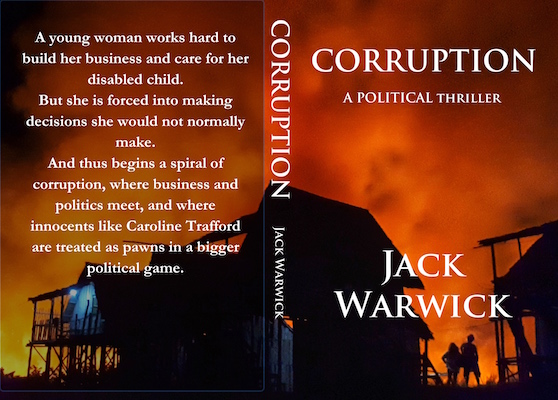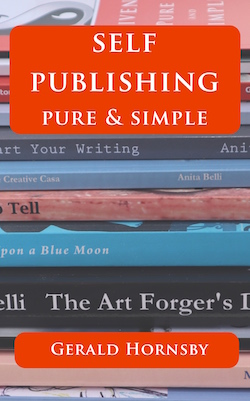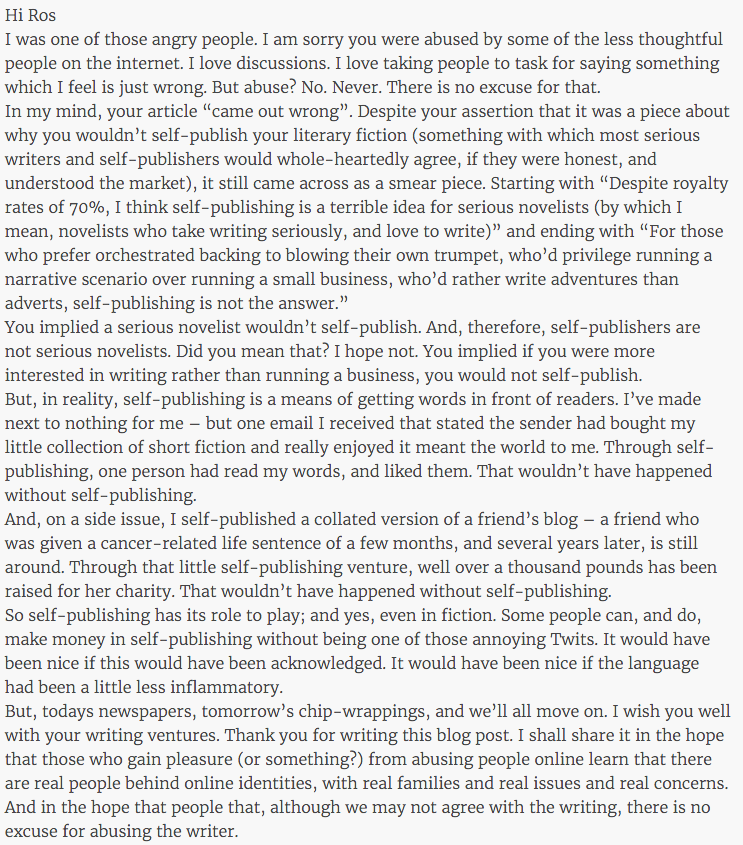I’m noticing a worrying trend. Some authors are getting so excited about making money from writing that the marketing is taking over from the writing. They’re not authors who are self-publishing any more. They are internet marketers that happen to be able to string together words in what they describe as a ‘novel’.
My hypothesis has a number of different strands of evidence to support it.
One of my ‘go-to’ places for self-publishing information is Kindle Boards. If you’re thinking of self-publishing, you need to be on there, and reading. It’s a busy place, and it does take you away from your writing, but if you’ve produced stuff, there’s a heap of information about how to self-publish on there. However, you could spend a whole day just following threads, commenting, asking questions, and then checking the threads you checked five minutes before. It’s become a bit of a monster, but the monster has some interesting bits. Go read.
But …
I’m a bit tired of reading threads from authors who have one, or two, pieces of work out there, and complain they’re not selling much. So the questions are not “how can I improve my writing so that it’s more appealing to people?” but “how can I market the hell out of what I’ve written so I can make more money?”
And then you have the witches covens. The little groups of authors, mostly on Facebook, but elsewhere too, who do the ‘back scratching’ thing. “You Tweet my book, and I’ll Tweet yours.” “Here’s my latest book. Please share.” “Anyone want to write a 5* review of my book? I’ll write one for you.”
I used to be part of one of these scummy organisations. Until I found myself promoting books that were awful. Truly awful. Clichéd, derivative, boring, predictable, and many more such adjectives. So I stopped. My writing integrity is worth more to me than a few sales. If I recommend a book, it’s because I love it. It’s not because I’m part of some circle jerk society.
Don’t get me wrong – in 2010, when self-publishing was really starting to take off, when the Kindle publishing system was starting to make inroads into the ebook market, it was a great time. We were like great explorers, banding together, finding new ways of doing things, fighting against what was already there. Sales figures were shared and applauded, big sellers were all over Kindle Boards, telling the rest of us what was working for them, and how many books they were selling. Amanda Hocking, Joe Konrath, Michael Sullivan, and many others. They’ve made tons of money, and they were our flag bearers in the indie publishing revolution.
But things are beginning to change. There are authors popping up who aren’t really authors. They’re intelligent, literate marketers. One in particular comes to mind. He wrote popular books, and he had a clever marketing strategy, which worked, and which sold him a million books, probably more. And then he wrote a book which told desperate authors how to sell a million books. And yes, I bought a copy.
There’s no discussion of writing craft. At all. It’s all marketing. How to reach out to potential purchasers. How to convert interested parties into buyers. How to use social media to improve the sales of your writing. Stuff like that.
And then we have the sock puppets. Used by an awful lot of authors, both minor and well-known. What’s a sock puppet? Wikipedia defines it as an online identity used for the purposes of deception. When an author creates a sock puppet (or several), they use that identity to post favourable reviews of their books. That’s poor. But some even use them to post bad reviews of those authors they perceive as competitors. That’s very poor indeed, verging on the fraudulent.
And you can buy reviews. You can send some money to a far-off land, where they have hundreds or thousands of different identities created, paying people a dollar a day, and they will post a positive review of your book. Yes, they can, and yes, they do. Use your local, friendly search engine, and you can find people who will review for cash.
To be honest, I’m starting to be offended.
Writing is hard. Writing takes a lot of effort, and a lot of practice. Traditionally, becoming a successful writer involves a lot of heartache, a lot of trial and error, and a lot of learning about the craft of writing. It involves sending your work off to an agent or publisher, who may, or frequently may not, give you a contract for it and subsequent works. Or, if you write short form, your work may appear in some sort of publication, you receive a bit of money, and you write some more.
Nowadays, people can write mediocre books, and then use principles of internet marketing to make those books successful. They can use underhand techniques to game the system, work the algorithms, get their books into the bestseller charts.
So what prompted this grumbling blog post?
I listen to a number of podcasts, and one in particular, I listen to every week. They had a guest on this week, an author, a successful author no less. And they spent an hour talking about how to be successful. What techniques to use, what services they employ, what other strings to their bow they have. Including public speaking, where they speak about self-publishing, and get paid to do so. And in doing that, they improve their profile, which sells more books, which raised their profile, which … you get the point.
So, has bookselling become unethical? Probably not. Selling books is about selling books, not being ‘fair’ or ‘moral’. It’s a business. Like publishers paying for premium space in book stores. Like choosing which books get put forward to competitions. Like conventions, where attendees pay money to sit and listen to people who talk about the book business. There is now a whole industry which has appeared from nowhere to ‘support’ indie authors. People will design your covers for you, edit your books for you, format your text for you, and market your books for you. All for a price. Welcome back to the world of vanity publishing.
Even worse are the agents and publishers who will send you a rejection letter, but suggest you get in touch with XYZ literary agency who, (for a modest fee), tell you what’s wrong with your novel and help you self-publish it. And market it. Here is a breakdown of the services they offer … (where, if you look closely, you will see strong personnel links to the agent / publisher you originally contacted). So the traditional publishing system can reject your manuscript, and in the past, that would be the end of it. But now, they can ‘help’ you, and make a little money for themselves on the side.
All business has its seedy side, and if you’re involved with that business, you need to be aware of it. But I’m an author. I love writing. For me, it’s not about how much money I can make from my mediocre meanderings. It’s about what sort of story I can tell.
For a proper author (as opposed to an internet marketer who writes), there is nothing which can compare to that first, second, and subsequent, message from a reader, congratulating you on your writing, and telling you that they loved your book. For me, that is more important than any amount of constructed wealth from an highly efficient (and, perhaps, slightly unethical) online marketing campaign.







